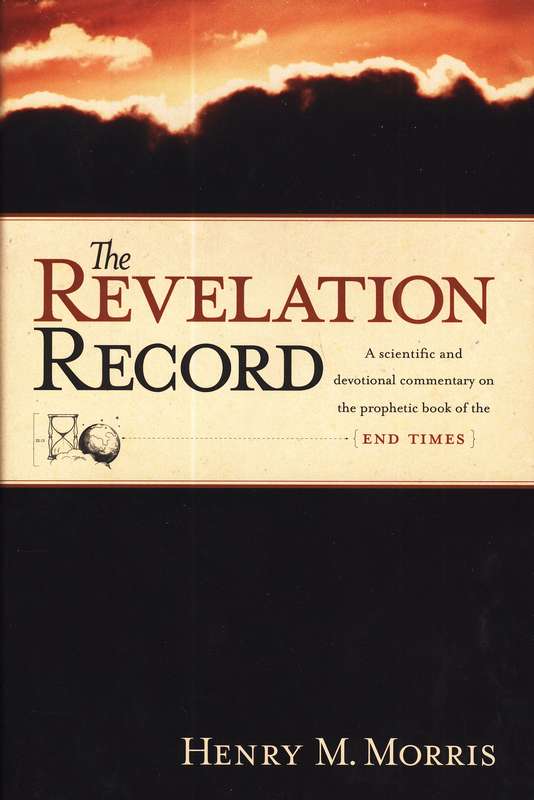 I am now the proud owner of two commentaries on the book of Revelation. The first one I purchased years ago is The Revelation Record by Henry Morris. Morris' framework is not only Dispensational but also some kind of King James Onlyism. It is one thing to claim that Revelation chapter 4 is a picture of heaven after the rapture, it is quite another to dispute textual critical scholars because Erasmus was somehow inspired to give us the basis of the King James Version.
I am now the proud owner of two commentaries on the book of Revelation. The first one I purchased years ago is The Revelation Record by Henry Morris. Morris' framework is not only Dispensational but also some kind of King James Onlyism. It is one thing to claim that Revelation chapter 4 is a picture of heaven after the rapture, it is quite another to dispute textual critical scholars because Erasmus was somehow inspired to give us the basis of the King James Version.Nevertheless, what was really interesting about Morris' viewpoint is that he attempted to interpret the book of Revelation in the same way that he interpreted Genesis. For those of you that may not know Henry Morris, he has been considered the father of the modern biblical creationist movement. As I see it, Henry Morris' approach to the Bible is a reaction to the theological liberalism of the 19th and 20th centuries. His interpretational method was a "literal whenever possible" approach, which is a swing in the other direction.
This approach to the Book of Revelation is simply unwise. You can not force upon a text the kind of literature you want it to be. Revelation is not written as a historical novel. It is apocalyptic literature.
Having now read through Riddlebarger's books on eschatology, I am now continuing on with Dennis E. Johnson's, Triumph of the Lamb: A Commentary On Revelation. Johnson raises the problem that Dispensationalists see. Johnson writes,
Now this sounds good. If you have ever discussed passages of the Bible with a Christadelphian, you know how spiritualizing biblical texts can lead in almost any direction the interpreter wants to go. The bible becomes a waxed nose ready to be shaped into our own image. However, as Johnson points out,Some have felt that in interpreting all biblical prophecy, whether in the Old Testament or in Revelation, the objectivity of the interpretive process and the historicity of God's acts could be safeguarded by assuming that prophetic speech should be interpreted literally where it can possibly be taken literally and symbolically only in texts that label images as symbolic or in which literalness yields an impossible or contradictory meaning.
In Revelation, however, a literal-where-possible mode of operation raises more problems than it solves.Johnson then goes on to explain some of the problems. Seeing that the problems remian for both sides, what do we do? Johnson offers seven "Principles for reading Revelation. Here they are in order.
1) Revelation is given to reveal.
2) Revelation is a book to be seen.
This next one is important. He writes in page 12,
What then will anchor our interpretation of this highly symbolic book to the meaning that God intends it to convey?3) Revelation makes sense only in light of the Old Testament.
4) Number count in Revelation.
5) Revelation is for a church under attack.
6) Revelation concerns "What must soon take place."
7) The victory belongs to God and to His Christ.
There is also a footnote that I saw expanded upon in Riddlebarger's book, A Case For Amillenialism. It explains the four levels of meaning throughout the book.
The first level is linguistic, or what the words,clauses, sentences, and paragraphs mean in the linguistic setting of Hellenistic Greek. The second is visionary: the visual experience of John that is portrayed and described in the language. The third is referential: the persons, forces, or events in history to which the images that John saw refer or point. The fourth is symbolical: what the visionary level of meaning, the images John saw in his visions, are revealing about the referential level, the persons, forces, events that the images symbolize.So far, I am impressed. Having been part of Dispensational churches for many years, it is difficult not to take Revelation literally while recognizing that it is not a book to be interpreted literally in the Fundamentalist sense. I think the radically different approaches will greatly alter what one sees from the text. As I attempt to plow through this book, I will try to offer some insights from the author as time allows.






No comments:
Post a Comment